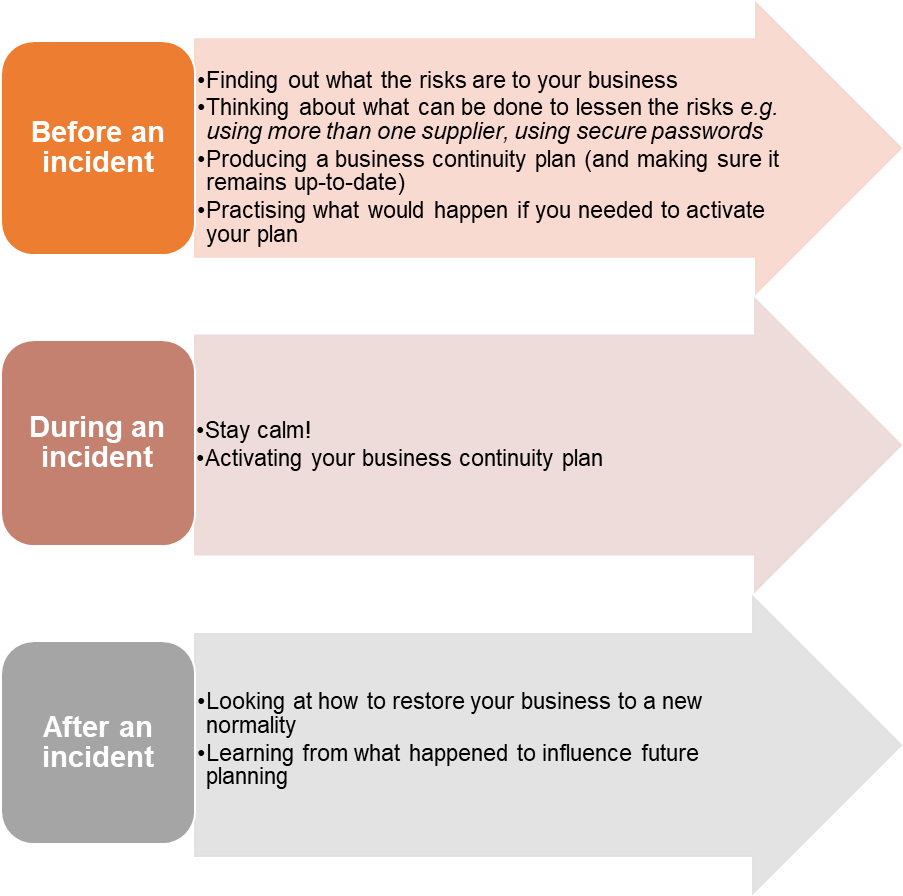Preparing Your Business
What would you do if you were faced with flooding, a cyber attack or a supply chain issue? These are just a small number of problems that could disrupt your business at any time.Business Continuity Management is about protecting your business from disruption, or creating a resilient business which can withstand disruption by identifying those parts of the organisation you can't afford to lose – such as information, stock, premises, staff, equipment, utilities and cash flow – and planning how to maintain these, if an incident occurs.
You can help your business by:

Without proper preparation many businesses would struggle to overcome the effects of a disruptive event. It is important to check how robust your risk knowledge and planning is to make sure your business is as ready as it can be when the worst happens.
Before an Incident
Risks
It is important to know what the risks are to your business so that you can plan to overcome the impacts of them. There is some useful information available through the Risks in Lancashire page which explains the national risks and those in your local area.The top risks for Lancashire are;
- Flu-type pandemic
- Flooding
- Terrorist attack
- Industrial incident
- Loss of essential services
- Cold weather and snow
- Heatwave
- Storms and gales
Planning
The Business Emergency Resilience Group, part of the Prince's Responsible Business Network, has produced a 10 minute plan which is a succinct tool to help small businesses begin their planning process.With an investment of only 10 minutes, you can complete a checklist which should help you think about;
- How to stay informed if something happens
- Understanding your business critical resources
- People
- Premises
- Data/systems
- Utilities
- Suppliers
- How to communicate to your staff and customers about the issues you are facing
When you feel you have sufficient plans in place, it is a good idea to test these to make sure they are fit-for-purpose before anything bad should happen. It's always reassuring to check your assumptions are correct.
Another important factor is to keep any plans current – the plan is only as good as the information contained in it. Have an annual review to ensure that everything is still accurate. Don't be finding that you have old contact lists when you are trying to contact staff during an incident!
Of course, there are a wealth of resources available if you would like to develop a more comprehensive assessment/plan or carry out your own exercise to check the validity of your plan. We have identified some useful pages offering free resources on the Further Information section.
During an Incident
If you or anyone else is in immediate danger, call 999- Have your plan to hand and activate it (is it accessible away from the office?)
- Think about what your insurers might need – take lots of pictures and videos as evidence of loss/damage
- Stay in contact with key people and keep them informed! What do staff, suppliers and customers need to know?
- Identify which business activities can continue and which may need to be put on hold
- Speak to people who may be able to help (e.g. local neighbouring businesses, Local Authorities)
- Follow #lancsalert on social media to get up-to-date information for any large scale incidents
After an Incident
Recovery can be a complex and long-running process and will probably involve more people than in the response phase on an incident.Be prepared that things will return to a 'new normal' – not necessarily the same, but this could also mean an improvement.
This is always a good time to reflect on what went well and what didn't go so well – it's how improvements for the future can be made. Plans may need amending depending on what happened during the incident.
Further Information
For more information about risks in Lancashire, how the Lancashire Resilience Forum plans to deal with them and what you can do to prepare, please download this guide.The Business Continuity Institute – a knowledge hub containing reports, case studies and webinars
Manchester City Council Business Continuity Planning – lots of valuable, free resources including templates, top tips and exercises
Environment Agency – useful information on flooding, tools to find out if you're at risk of flooding and how to sign up for flood warnings
The Flood Hub – specific flood related information for businesses
Would You Be Ready? - a readiness test from Business in the Community to discover quick, simple actions that could be taken to improve the resilience of an organisation


